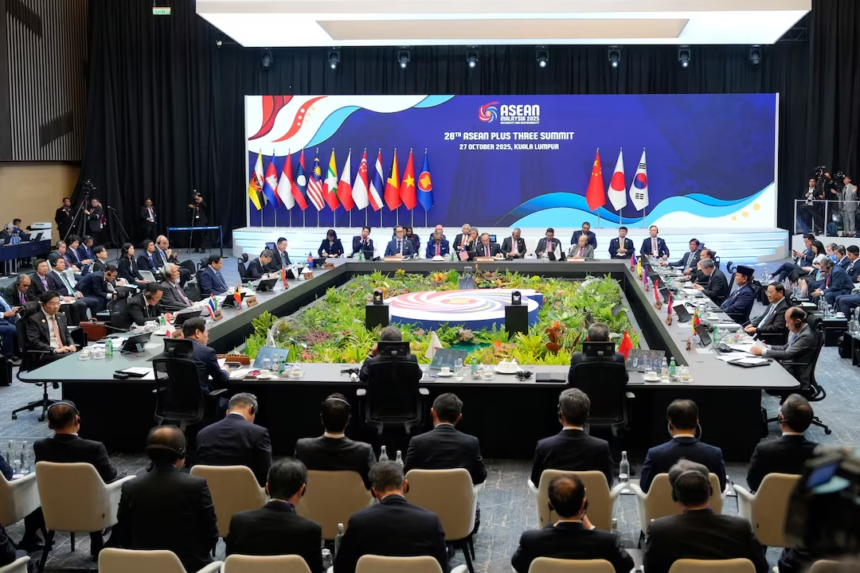Global leaders convened in Malaysia on Monday to strengthen economic and trade ties following the departure of U.S. President Donald Trump from the ASEAN Summit. The meeting, overshadowed by concerns over looming U.S. tariffs, featured high-level discussions aimed at stabilizing regional cooperation and advancing trade frameworks.
Trump and Rubio Leave ASEAN Summit Early
President Trump and U.S. Secretary of State Marco Rubio departed the summit earlier on Monday to continue their regional tour, leaving U.S. trade and diplomatic officials to represent Washington in subsequent discussions.
Before his departure, Trump oversaw the signing of an expanded ceasefire agreement between Cambodia and Thailand, along with four new regional trade deals. However, according to the White House, these framework agreements did not reduce U.S. tariffs on Cambodia, Malaysia, Thailand, or Vietnam, though they allow for limited exemptions.
“Our message to the nations of Southeast Asia is that the United States is with you 100%,” Trump said, emphasizing long-term partnership during the announcement of a temporary tariff pause with China.
RCEP Summit Takes Center Stage
Following Trump’s exit, attention shifted to the China-backed Regional Comprehensive Economic Partnership (RCEP) summit, bringing together ASEAN’s 10 members along with Australia, Japan, New Zealand, and South Korea.
The RCEP, which covers about 30% of global GDP, is seen as a potential buffer against escalating U.S. tariffs and a platform for promoting trade multilateralism. Chinese officials are expected to advocate for deeper regional integration and economic cooperation amid ongoing trade tensions with Washington.
EU and China Discuss Supply Chain Tensions
At a bilateral meeting, European Council President Antonio Costa met with Chinese Premier Li Qiang to address growing concerns over Beijing’s export controls on critical raw materials.
“I urged him to restore as soon as possible fluid, reliable, and predictable supply chains,” Costa stated, adding that the EU also sought China’s cooperation in efforts to end the war in Ukraine.
China’s dominance in the supply of rare earth magnets and minerals, which account for 90% of global production, remains a major point of contention in its trade standoff with the United States.
Lula Secures Promises of Trade Cooperation
Meanwhile, Brazilian President Luiz Inácio Lula da Silva said his meeting with Trump on Sunday “guaranteed” progress toward a fairer trade agreement.
The United States has imposed 50% tariffs on Brazilian exports in response to the sentencing of former President Jair Bolsonaro. Lula emphasized Brazil’s regional influence as a key factor in trade talks:
“I told him it was extremely important to consider Brazil’s experience as South America’s largest and most economically significant country,” Lula said.
ASEAN Members Continue Economic Dialogue
The Association of Southeast Asian Nations (ASEAN) — comprising Brunei, Cambodia, Indonesia, Laos, Malaysia, Myanmar, the Philippines, Singapore, Thailand, East Timor, and Vietnam — continues to play a central role in fostering regional stability and economic collaboration amid global trade uncertainty.







